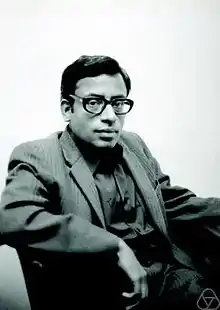K. R. Parthasarathy
K. R. Parthasarathy (Kalyanapuram Rangachari Parthasarathy;[1] * 25. Juni 1936[2] in Chennai) ist ein indischer Mathematiker, der sich mit Stochastik befasst.

Leben
Er studierte am Ramakrishna Mission Vivekananda College in Chennai mit dem Bachelor-Abschluss in Mathematik und wurde 1962 bei C. R. Rao am Indian Statistical Institute (ISI) in Kalkutta promoviert (Some problems in ergodic theory and information theory)[3], als erster Doktorand am ISI. Dort war er einer von vier schon damals herausragenden Studenten, die am ISI miteinander forschten und später die Famous Four genannt wurden (die anderen waren V. S. Varadarajan, R. Ranga Rao, S. R. Srinivasa Varadhan). Als Post-Doktorand war er 1962/63 am Steklow-Institut in Moskau bei Andrei Kolmogorow, der zuvor Indien besucht hatte. In Moskau nahm er an den Seminaren von Israel Gelfand und Eugene Dynkin teil. Ab 1964 war er Professor für Statistik an der University of Sheffield, 1968 bis 1970 an der University of Manchester und danach an der University of Nottingham. Zurück in Indien war er zunächst an der University of Mumbai (Bombay) und am Indian Institute of Technology in Delhi bevor er 1976 an den neu gegründeten Ableger des ISI in Delhi ging, wo er die mathematische Statistik aufbaute und bis zu seinem Ruhestand 1996 blieb.
Mit Robin L. Hudson (1940–2021) entwickelte er in Manchester und Nottingham eine Quanten-Version des Ito-Kalküls[4] (Quantum Stochastic Calculus).[5] Außerdem befasste er sich unter anderem mit Informationstheorie, Grenzwertsätzen in der Statistik, Liegruppen und Wahrscheinlichkeitsmaße auf diesen und mit der mathematischen Behandlung der Quantenmechanik.
1977 gewann er den Shanti Swarup Bhatnagar Prize für Wissenschaft und Technologie.
Schriften
- Probability measures on metric spaces (= Probability and Mathematical Statistics. 3, ZDB-ID 416538-X). Academic Press, New York u. a. 1967.
- Multipliers on locally compact groups (= Lecture Notes in Mathematics. 93). Springer, Berlin u. a. 1969.
- mit Klaus Schmidt: Positive definite kernels, continuous tensor products, and central limit theorems of probability theory (= Lectures Notes in Mathematics. 272). Springer, Berlin u. a. 1972, ISBN 3-540-05908-3.
- Introduction to probability and measure. Macmillan, London 1977, ISBN 0-333-21855-8.
- mit Rajendra Bhatia: Lectures on Functional Analysis. 2 Bände. Macmillan, New Delhi 1978–1979;
- Band 1: Perturbation by bounded operators (= Indian Statistical Institute Lecture Notes Series. 3). 1978, ISBN 0-333-90271-8;
- Band 2: Perturbation by unbounded operators (= Indian Statistical Institute Lecture Notes Series. 6). 1979, ISBN 0-333-90310-2.
- mit Robin L. Hudson: Quantum Ito's formula and stochastic evolutions. In: Communications in Mathematical Physics. Band 93, Nr. 3, 1984, S. 301–323, (online).
- An introduction to quantum stochastic calculus (= Monographs in Mathematics. 85). Birkhäuser, Basel u. a. 1992, ISBN 3-7643-2697-2.
- als Herausgeber mit Jayanta K. Ghosh, Sujit K. Mitra: Glimpses of India’s statistical heritage. Wiley Eastern, New Delhi u. a. 1992, ISBN 81-224-0423-5.
Weblinks
Einzelnachweise
- Der Name des Herkunftsorts der Familie Kalyanapuram, und das Patronym Rangachari werden, wie in Südindien üblich, dem Namen abgekürzt vorangestellt, Parthasarathy ist der Rufname. Familiennamen sind in Südindien nicht üblich.
- Kalyanapuram Rangachari PARTHASARATY (Memento des Originals vom 8. September 2014 im Internet Archive) Info: Der Archivlink wurde automatisch eingesetzt und noch nicht geprüft. Bitte prüfe Original- und Archivlink gemäß Anleitung und entferne dann diesen Hinweis. bei mathunion.org
- Mathematics Genealogy Project
- Nach Itō Kiyoshi, siehe Stochastische Integration
- Quantum Stochastic Calculus, Mathworld